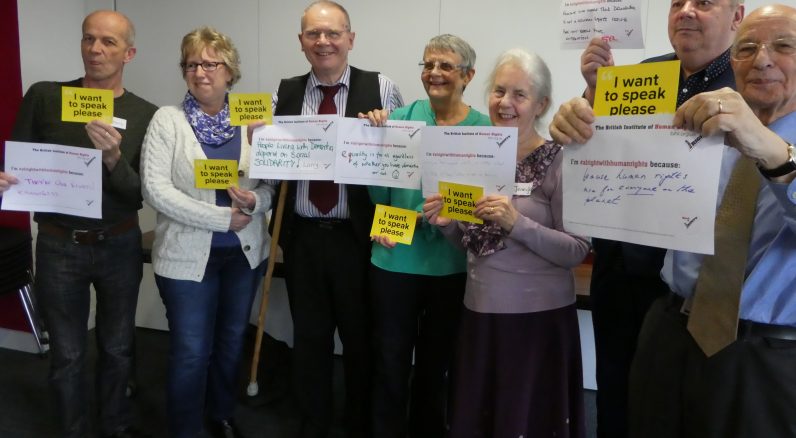Our work at Innovations in Dementia[1] supports people with dementia to keep control of their lives, and be happy. People with dementia are at the heart and start of all our work. Working alongside them, we promote a positive, though realistic, view of dementia, demonstrating that, although it is life changing, it does not have to be life ending. Indeed people with dementia are showing us all that they can recover – by which we mean that they can recover voice, control, identity and a place in their relationships and communities which often gets lost.
So what glimpses of the future of ‘social care’ can we offer, based on the work we do and the people we work with?
Well first of all, the very phrase ‘social care’ ties us up in knots, and acts as a huge barrier to new and creative imaginings. It carries heavy overtones of passivity, of being ‘done-to’ and ‘cared-for’, of tasks not processes, of institutions not relationships. It ignores the power of reciprocity[2]. It is grounded in an artificial and unhelpful dichotomy of means-tested social services versus free-at-the-point-of-delivery ‘continuing healthcare’; of grey areas such as ‘social bathing’ versus ‘health bathing’; of the very different cultures of the NHS and the Local Authorities.
For people with dementia (and their families and allies) these distinctions are frustrating, incomprehensible, energy-sapping, inequitable, paralysing. As Wendy Mitchell recently asked: ““Why, when we say we have dementia, are we given a sad embarrassing look, with no words of encouragement? Why do we have to try to venture into the maze of bureaucracy to find, MAYBE, what we need? … Why is it that people with dementia are ignored and not deemed worthy enough of help? Why do I feel like we’re at the bottom of the pecking order, simply because we have dementia?”[3]
Many people with dementia come up against this chasm of indifference – which the Chair of Dementia Alliance International (DAI), Kate Swaffer, so perfectly describes as ‘prescribed disengagement™️’. As she testifies, “Many doctors and service providers continue to promote giving up on life and ignore the possibility of living positively with dementia with proactive disability support, including rehabilitation.”
The DAI calls for a support pathway[4] which includes:
- Focus on assets, not deficits, and quality of life.
- Community-based rehabilitation.
- Acquired brain injury rehabilitation immediately post-diagnosis, which includes exercise and other lifestyle changes in line with other chronic diseases, speech pathology, a neuroplasticity approach, occupational therapy and neurophysiotherapy.
- Disability assessment and support, immediately post-diagnosis.
- Grief and loss counselling, not just information about dying, aged care and ‘challenging behaviours’.
- Peer-to-peer support groups for people with dementia, our care partners and families, and for those with younger onset dementia, our older parents and our children.
- Support to maintain our pre-diagnosis lifestyle, if this is our choice.
- Support to continue working if a person with younger onset dementia, again if this is our choice.
- Support to continue usual activities, socialising, sport, recreation, community engagement, volunteering.
- Inclusive and accessible communities – not just dementia-friendly, as too often the awareness-raising initiatives are still based on our deficits.
- Palliative care.
Our work with many hundreds of people with dementia across the UK – through initiatives such as DEEP (The UK Network of Dementia Voices)[5], the Dementia Diaries[6] and Dementia Enquirers[7] – very strongly supports this vision. People with dementia are stating loud and clear that many of the barriers they face day to day are social, environmental and attitudinal – just as the wider disability movement has been saying for so long. They are also demonstrating that – surprise, surprise – they can adapt and adjust to (even ‘outmanoeuvre’[8]) many of the challenges they face, and can contribute their skills and expertise in so many ways.
So how about reframing social care as something like ‘Citizen Enablement’? That may not be the perfect terminology – but at least it highlights both our universal human rights to be supported and included, and also our capacity for ‘recovery’ and re-ablement – even when we live with a condition such as dementia. The future of ‘social care’ for people with dementia cannot be the social care we know, with its users, its providers, its commissioners, its regulators, its policy-makers and its legislators, all firmly in their different camps. It must be a collaborative social movement which really enables citizens, founded on the voices of those with the lived experience, on the principles of independent living, on choice and control, and on recognition of human rights[9]. It must be proactive, not reluctantly and belatedly reactive. It must be fair – not shaped by ageism[10] and sexism[11]. It must be simple, accessible, affordable. It must be of a human scale. It must be based on the ‘social experience of disability’[12] and draw on the skills of occupational and other therapies. It must focus on confidence building, not compliance. It must be proud, assertive and value-based.
The last word goes to Agnes Houston, one of our fifty Dementia Diarists:
“I was diagnosed with dementia of the Alzheimer’s type eleven years ago. I feel it was in the dark ages… Now… yes, more voices of people with dementia are being heard. We are shouting, shouting loud…We are now a movement, a United Kingdom movement, who demand our rights…”
Philly Hare
Co-Director, Innovations in Dementia
[1] http://www.innovationsindementia.org.uk/
[2] ‘Not a one way street: Research into older people’s experiences of support based on mutuality and reciprocity’ Bowers et al 2011. JRF. https://www.jrf.org.uk/report/not-one-way-street-research-older-peoples-experiences-support-based-mutuality-and-reciprocity
[3] You can hear Wendy’s full audio Diary at http://bit.ly/2SnI99C
[4] ‘Human rights, disability and dementia’. Originally published in Australian Journal of Dementia Care February March 2018 Vol 7 No 1 http://journalofdementiacare.com/human-rights-disability-and-dementia/
[5] http://dementiavoices.org.uk/
[6] https://dementiadiaries.org/
[7] http://www.innovationsindementia.org.uk/2018/10/developing-an-alternative-research-involvement-framework-through-deep/
[8] Wendy Mitchell’s phrase, see her blog https://whichmeamitoday.wordpress.com/
[9] ‘Dementia, rights, and the social model of disability’. Mental Health Foundation 2015
[10] ‘That Age Old Question’ Royal Society for Public Health 2018 https://www.rsph.org.uk/uploads/assets/uploaded/010d3159-0d36-4707-aee54e29047c8e3a.pdf
[11] Dementia: through the eyes of women. Savitch et al 2015 JRF http://eprints.whiterose.ac.uk/91782/3/womendementia_literature_review.pdf
[12]Tom Shakespeare https://farmerofthoughts.co.uk/article/is-dementia-a-disability/

